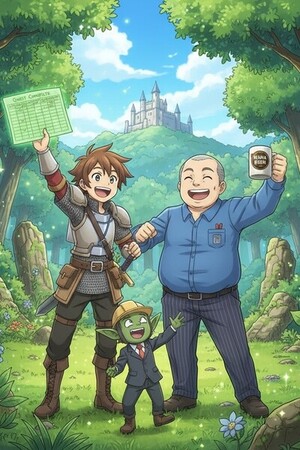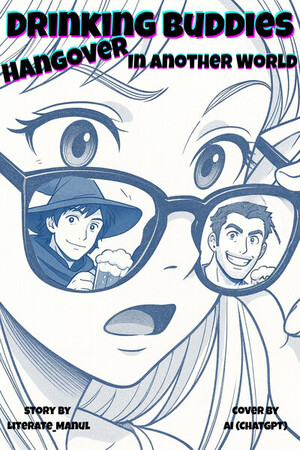Chapter 33:
Kenji
Earthly Solutions
Selena's reaction to the portal's appearance was practical and systematic.
"So," she said, setting down her hammer and looking at me with the focused attention she applied to complex technical problems, "we have a choice between returning to your original world or staying in this one."
"That's the situation," I confirmed. "And we probably need to decide fairly quickly, before the portal closes or becomes unstable."
She was quiet for a moment, considering the implications with the same methodical approach she applied to metallurgical challenges.
"What are the advantages of returning to your world?" she asked.
"Modern technology, reliable infrastructure, legal systems that protect individual rights, economic frameworks that reward competence," I listed. "Conveniences like electricity, internet access, and bathroom facilities that don't require strategic planning."
"And the disadvantages?"
"Meaningless work, corporate mediocrity, no community that appreciates what we do, and no opportunity to implement the kind of systematic improvements we've been developing here."
"What about the advantages of staying?"
"Meaningful work, genuine professional fulfillment, relationships and community that we've built, and the opportunity to continue making a real difference in people's lives."
"And the disadvantages of staying?"
"Medieval technology, occasional threats from corrupt officials or hired muscle, and the constant challenge of maintaining systematic optimization in a world that wasn't originally designed for it."
Selena was making mental calculations, weighing factors with the precision she applied to determining optimal alloy compositions.
"Hiroshi," she said finally, "I need to tell you something about my situation that might affect your decision."
"What's that?"
"I've been experimenting with magical enhancement of metallurgical processes," she said, showing me what appeared to be a piece of equipment that definitely hadn't existed when we first met. "Specifically, techniques that might be applicable in your original world if properly adapted."
I examined the device, which looked like a cross between a traditional forge and something that belonged in a science fiction movie.
"You mean you've developed technology that could work on Earth?"
"I've developed techniques that use magical principles to achieve results that might be replicable using advanced materials science and engineering approaches," she corrected. "The specific methods wouldn't transfer directly, but the underlying principles could potentially be adapted to non-magical industrial applications."
The implications hit me immediately. "You're saying that returning to Earth wouldn't necessarily mean abandoning the professional innovations we've developed here?"
"I'm saying that the systematic approaches we've refined in this world might have applications in your original world that we haven't fully explored," she said. "Plus, my experience with advanced metallurgy could provide opportunities for professional collaboration that didn't exist before our relationship."
I realized that Selena was offering something I hadn't considered: the possibility that our interdimensional experience could enhance our Earth careers rather than simply replacing them.
"What about your business here? Your reputation, your clients, your established operation?"
"All of those were built through systematic application of professional excellence," she replied. "The same principles that enabled success here should enable success anywhere, provided the basic economic and legal frameworks are sound."
"And you'd be willing to give up everything you've built here to start over in a completely different world?"
"I'd be willing to expand my professional capabilities by applying my skills in a new environment with different challenges and opportunities," she corrected. "It's not giving up what I've built, it's building on what I've achieved."
Her perspective was compelling, but it also made me realize that my decision was ultimately independent of hers.
"Selena," I said, "regardless of what opportunities might exist for you on Earth, I need to decide what I want to do with my own life."
"And what do you want to do?"
I thought about Mr. Tanaka, currently organizing handover procedures for systematic reform projects that might never be completed if he left. I thought about our clients, who had come to depend on our optimization services. I thought about the community we'd accidentally created around professional excellence and systematic improvement.
"I want to stay," I realized. "Not because Earth doesn't offer opportunities, but because this world offers the specific opportunity I value most: meaningful work that makes a genuine difference in people's lives."
"Even if it means giving up modern conveniences and reliable infrastructure?"
"Especially if it means giving up modern conveniences for meaningful work," I said. "Because I've learned that professional fulfillment is more important than personal comfort."
"And if I decide to come with you to Earth?"
I looked at her, noting the way she was approaching this decision with the same systematic analysis she applied to every important choice.
"Then you decide based on what's best for your professional development and personal satisfaction," I said. "Not based on what you think I want or what would be most convenient for our relationship."
"Fair enough." She was quiet for another moment, clearly working through her own decision-making process. "Hiroshi, I've spent my entire career in this world, in this technological and economic framework. The opportunity to apply my skills in a completely different environment, with different materials and different engineering challenges..."
"Sounds like the kind of professional challenge you've always been drawn to," I finished.
"Exactly. Plus, the systematic approaches we've developed here—the optimization techniques, the quality control methodologies, the integration of individual excellence with institutional improvement—those could have significant applications in your world's industrial and economic systems."
I realized that Selena was making the same choice I was, but in the opposite direction: choosing meaningful professional challenge over familiar comfort.
"So, you want to return to Earth?"
"I want to expand my professional capabilities by tackling challenges that don't exist in this world," she said. "But more than that, I want to continue our partnership in whatever environment offers the best opportunities for both of us to achieve meaningful work."
As we walked back toward the Royal Treasury, where Mr. Tanaka was presumably still dealing with the portal and his comprehensive organizational projects, I realized that our interdimensional adventure had created three different but equally valid responses to the choice between worlds.
Mr. Tanaka had found his true calling in systematic institutional reform and wanted to stay to complete work that genuinely mattered to him. Selena saw an opportunity for professional advancement and wanted to explore new challenges in a different technological environment. And I had discovered that meaningful work was more important than comfortable living.
"Think Mr. Tanaka will understand our decision?" Selena asked.
"I think Mr. Tanaka will understand that everyone needs to make choices based on their own professional priorities and personal values," I replied. "Plus, he's probably too busy organizing documentation procedures to be disappointed about personal decisions."
When we reached the Royal Treasury, we found Mr. Tanaka exactly where we'd left him: surrounded by comprehensive organizational projects and systematically documenting handover procedures with the methodical precision of someone who refused to leave any project incomplete.
"Mr. Tanaka," I said, "Selena and I have decided to return to Earth."
He looked up from his documentation with the expression of someone who had expected this decision but was still processing its implications.
"I understand," he said simply. "Your opportunities for meaningful work exist in both worlds, while mine exist primarily here."
"And you're staying?"
"I'm staying," he confirmed. "This is the first time in my adult life that I've found work that feels genuinely important, and don’t have anything to return to."
"Even if it means we won't see each other again?"
"Even then," he said with quiet conviction. "Because meaningful work is worth more than convenient relationships, and professional fulfillment is more important than personal comfort."
As we prepared for our departure, I realized that our interdimensional business adventure had accomplished something remarkable: it had taught all three of us what we valued most in our professional and personal lives.
Those values were worth making difficult choices to protect.



Please sign in to leave a comment.